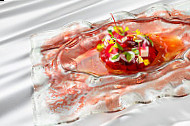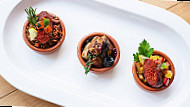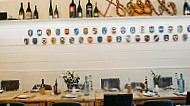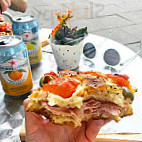Téléphone: +494070298570
Adresse: Große Elbstraße 49, 22767 Hamburg, Germany
Ville: Hamburg
Menu Plats: 35
Avis: 13475
"Moin Moin Very nice description and evaluation of Rene S, only today fish market has nothing more in common with the fish market of then. Even if it's been a long time ago, I would like to describe him as I had experienced him at that time because I was there almost every Sunday to earn my pocket money, especially like the 10 DM, for the week. The site at the time of the Sunday fishing market took place where the fishing house is still in St. Pauli Hafenstrasse, which today is called St. Pauli Fischmarkt 14 and ended in Grosse Elbstr. 42, right behind the fish auction hall. Here was always a colorful ride and there stood fish stand next to fish stand. The old Hamburger original, also Aale Aale, was heard as it offered its aale with a thin fist. It was a small old man with a dark vest and always a melon on his head. Karl Wilhelm Schreiber died in 1971 in the nursing home Farmsen. [here link] In the past there was also the St. Pauli Fischauktionshalle next to the Altonaer Fischauktionshalle, which was badly damaged in 1971 because the Hamburg Senate had planned a new building there. This planning failed and today there is a large parking lot. In the Altonaer Fischauktionshalle, which after a long time was still under monumental protection, because the demolition threatened, after reconstruction, Sunday events were carried out and also the great public view of the 2006 World Cup was carried out. See photo Jolly swinging with small turret in arm. (Hamburg-Altona) On the water side of the fish auction hall there is an investor in which at this time the fishing boats Finkenwerder docked on Sundays and sold their fresh fish from the knife. I often accompanied my Chinese friend Kung Wen Tai, with whom I learned Chinese cooking for a month in Hong Kong, and we bought there two to three bags with living woven handcuffs, drove to the Chinese ships in the free port and sold them there. In China it is a delicacies, I liked them very well. On weekdays, cattle transporters and live pigs and cattle were loaded and taken to the Hamburg slaughterhouse where they were slaughtered. Opposite the fish auction hall there is a large square that bears the name fish market. At my active time, poultry and small animals were sold in the upper part. When I was three or four years old and my father came from Lake, he was a ship engineer, we went to the fish market and he bought me a shepherd puppet. For 15 years he was my loyal companion until I had to sleep because he was only tormented and full of cancer. He accompanied me to the vet with his proud head and knew I wanted him to be freed of his pain. After he got the redeeming syringe, he slept gratefully in my arms. Here were the fruit sellers. They moved to the back of the cult Carl, who is still an institution on the fish market and was drained by almost every storm flood. Often I was lucky and was allowed to pack and sell 10 oranges for a brand. For this I always got so much “life” that I could go to the cinema and had some money available for Schnopkram over the week. After the goods were sold or the end of the market was announced, I ran quickly towards Pepermöhlenbek, where the Strumpfoma had its stand, brought her suitcase 200 meters further to the taxes she brought home. There was always a sign. Of course, there were also the “Sonntags” of the Reeperbahn, who bleed over the fish market in the “dun-kopp” with a fish on the band they pulled behind. I want to doubt if they did. I would like to remember this time, because on Sunday the BILD also cost only 30 pens and the cinema in the children's performance at Ahoi Kino or a bit further in the star that later became the star club, at 10.00 a.m. and at 13.00 a.m. 50 pens. But on Sunday the whole family was sitting at 12.30 a.m. at lunch table. There were no exceptions. And after the dog got his role, we went to Gassi. He was as firm to me as now my little Jenna. I'm a dog whisper."
Menu complet - 35 options
Tous les prix sont des estimations sur Menu.
Pizza
Salades
Pâtes
Salade
Riz
Plats Principaux
Antipasti - Entrées
Calzone
Pizza, Normale
Entrées
Plat Principal
Adresse

Avis
Hamburg

Hambourg, une ville portuaire du nord de l'Allemagne, est connue pour son patrimoine maritime, sa culture vibrante, et ses plats locaux comme le Fischbrötchen et le Labskaus. C'est un mélange de charme ancien et d'ambiance moderne.
Catégories
-
Pasta Régalez-vous avec notre sélection de plats de pâtes classiques et contemporains, chacun élaboré avec des ingrédients frais et de qualité et des sauces savoureuses qui capturent l'essence de la cuisine italienne à chaque bouchée.
-
Fisch Régalez-vous avec nos plats de poisson exquis, conçus à partir de la prise du jour la plus fraîche. Des grillades favorites aux ragoûts savoureux, notre menu célèbre la richesse de l'océan avec des saveurs pour satisfaire tous les palais. Voir le carte
-
Salate Fraîches et vivantes, nos salades sont élaborées avec des ingrédients de saison et un mélange de verdures croquantes, de légumes colorés et de vinaigrettes uniques, offrant un choix délicieux et sain pour tous les palais.
-
Hamburger Des hamburgers juteux et délicieux faits avec du bœuf de qualité supérieure, des garnitures fraîches et des petits pains moelleux. Personnalisez votre burger avec un large éventail de fromages, sauces et extras pour une expérience savoureuse.




























